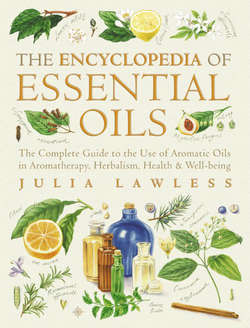Читать книгу Encyclopedia of Essential Oils: The complete guide to the use of aromatic oils in aromatherapy, herbalism, health and well-being. - Julia Lawless - Страница 45
ALMOND, BITTER
ОглавлениеPrunus dulcis var. amara
FAMILY Rosaceae
SYNONYMS P. amygdalus var. amara, Amygdalus communis var. amara, A. dulcis, P. communis.
GENERAL DESCRIPTION The almond tree grows to a height of about 7 metres and is popular as a garden tree due to its pinky-white blossom. It is botanically classified as a drupe.
DISTRIBUTION Native to Western Asia and North Africa, it is now extensively cultivated throughout the Mediterranean region, Israel and California.
Almond Tree
OTHER SPECIES There are two main types of almond tree – bitter and sweet. The sweet almond does not produce any essential oil.
HERBAL/FOLK TRADITION A ‘fixed’ oil commonly known as ‘sweet almond oil’ is made by pressing the kernels from both the sweet and bitter almond trees. Unlike the essential oil, this fixed oil does not contain any benzaldehyde or prussic acid, and has many medical and cosmetic uses. It is used as a laxative, for bronchitis, coughs, heartburn and for disorders of the kidneys, bladder and biliary ducts. It helps relieve muscular aches and pains, softens the skin and premotes a clear complexion.
ACTIONS Anaesthetic, antispasmodic, narcotic, vermifuge (FFPA).
EXTRACTION Essential oil by steam distillation from the kernels. The nuts are first pressed and macerated in warm water for 12 to 24 hours before the oil is extracted. It is during this process that the prussic acid is formed; it is not present in the raw seed. Most commercial bitter almond oil is rectified to remove all prussic acid, i.e. free from prussic acid (FFPA).
CHARACTERISTICS Light colourless liquid with a characteristic ‘marzipan’ scent (FFPA).
PRINCIPAL CONSTITUENTS Benzaldehyde (95 per cent), prussic acid (3 per cent).
SAFETY DATA Prussic acid, also known as hydrocyanic acid or cyanide, is a well-known poison. Benzaldehyde is also moderately toxic.
AROMATHERAPY/HOME USE None. ‘Should not be used in therapy either internally or externally.’2
OTHER USES Bitter almond oil is no longer used for internal medication. Rectified bitter almond oil is used for flavouring foods, mainly confectionery; the most common uses are ‘almond essence’ and marzipan. The oil (FFPA) is increasingly being replaced by synthetic benzaldehyde in food flavourings.
